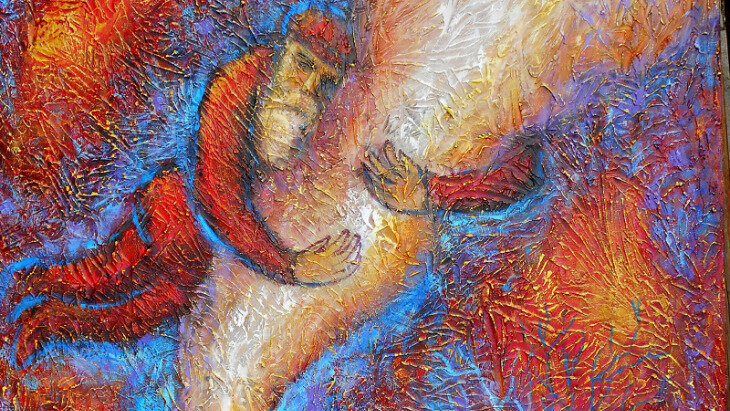 An Open Letter to University Presidents
An Open Letter to University Presidents


6 min read
A careful translation of some of Judaism’s most important terms reveals its deeper spiritual underpinnings.
The classic story is told of an atheist who meets with a great rabbi but is quite shocked when the rabbi opens by telling him, “You know, I also don’t believe in God.” Seeing the puzzlement on the atheist’s face, the rabbi continues, “The god you don’t believe in, I also don’t believe in.” God, and the meaning of God’s word, the rabbi was saying, are often lost in translation.
Translating terms from one language to another, is not a simple task. Especially when it comes to religion and spirituality. In their original language, words have multidimensional, rich, and complex meaning and translation involves choosing to focus on one aspect while cutting away the rest.
It would be a terrible, reductionist mistake to diminish Jewish life to merely a matter of laws and legalities.
Translating Jewish terms from Hebrew to English is no exception. Yet, in order for Judaism to gain continuity across time and space, translation is often necessary.
So, let me ask you – how do you translate the following terms that stand at the center of Jewish life: halacha, mitzvah, mutar, and assur? Chances are you’re not familiar with these terms. The standard, typical translations go like this:
These translations are not wrong, but they’re incomplete. It would be a terrible, reductionist mistake to diminish Jewish life to merely a matter of laws and legalities. Here is another set of translations that convey a more multidimensional meaning:
These translations convey a very different aspect of Jewish life than the first set of translations. While the first set fits into a legal context, the second set lends itself to a more relational context. And that is the primary goal of Judaism – forging a relationship with God.
Halacha, from a relational and loving perspective, means a way of walking because the mitzvot are pathways to connection and intimacy. God gave us halacha, Jewish law, as a pathway to connect with Him.
The rabbinical sages teach that the reward of a mitzvah is mitzvah. The Ba’al Shem Tov, the great founder of Chassidut, taught that this means that the reward of connection is the connection itself. The value and benefit of connecting with our beloved is the experience of being connected to him or her. And so it is with God, the value of being connected is the experience of being connected. This is what the commandments of Judaism offer us – loving connection to God.
Mutar, permitted, means open because an item or behavior that is mutar offers an open pathway to connect with God. When a food is mutar, permitted to eat, it is an open pathway to connection. When something is assur, prohibited, it means that it is blocked and closed off from serving as a pathway to connection. It is a dead-end. When a food is assur, prohibited to eat, it is a brick wall that will not allow us access to God. It is spiritually blocked.
Putting this together, we emerge with three types of behaviors and objects in the world: connectors (mitzvot, commandments), openings (heterim, permitted), and closures (issurim, prohibitions). Mitzvot are the behaviors and objects that offer an automatic connection to God. When there is a mitzvah to eat, put on tefillin, or keep shabbat, then this behavior creates an automatic connection to God regardless of whether or not the person has deep spiritual intentions while performing the behavior. Of course, it’s preferable to have spiritual consciousness, but the connection that a mitzvah forges between you and God is inherent in the act. Think of it as creating a spiritual circuit that enables electricity to flow.
On the other hand, the opposite can be true as well. There are behaviors and items that are assur, prohibited. They are inherently blocked from connection. So, even if a person does have deep, profound spiritual intentions, something that is prohibited cannot serve as a conduit for connection.
With these blocked pathways, come the terms aveirah (transgression) and chet (sin), which means to pass over or miss the mark. In this sense, to sin means to miss the connection. To misalign and pass by the intended target. To fall out of connection with God.
Judaism is about creating a relationship.
And then there is an in between category: behaviors and items that are mutar (permitted) – they are open. These things depend on a person’s intention. Eating food that is permitted but is not a mandated mitzvah does not automatically connect you to God but can connect you, if you so intend.
Judaism includes both sets of definitions and both forms of relationship with God. The hierarchal commandment structure and the loving, personal relationship. Yet, it seems that many people view Judaism as a laundry list of impositions, associating it more with the legal set of definitions. This can understandably distance them from Jewish life. But Judaism is, in fact, about creating a relationship, brimming with the more experiential, emotional, and spiritual facets. A deeper understanding of some of Judaism’s key terminology reveals God’s true desire to be closely connected and deeply in love with each of His creations.
Rabbi Yakov Danishefsky’s recent book, Attached: Connecting to Our Creator, A Jewish Psychological Approach, explores Jewish life from the perspective of forging a relationship with God. The book is based on the belief that we need both sets of translations so that each of us can find a personal, meaningful, and empowering relationship with the Almighty. When we engage the idea that God loves us, desires us, and made it possible for us to be close to Him, we open an entirely different dimension of Judaism and our lives.
Featured Image Artwork: by Leon Zernitsky
